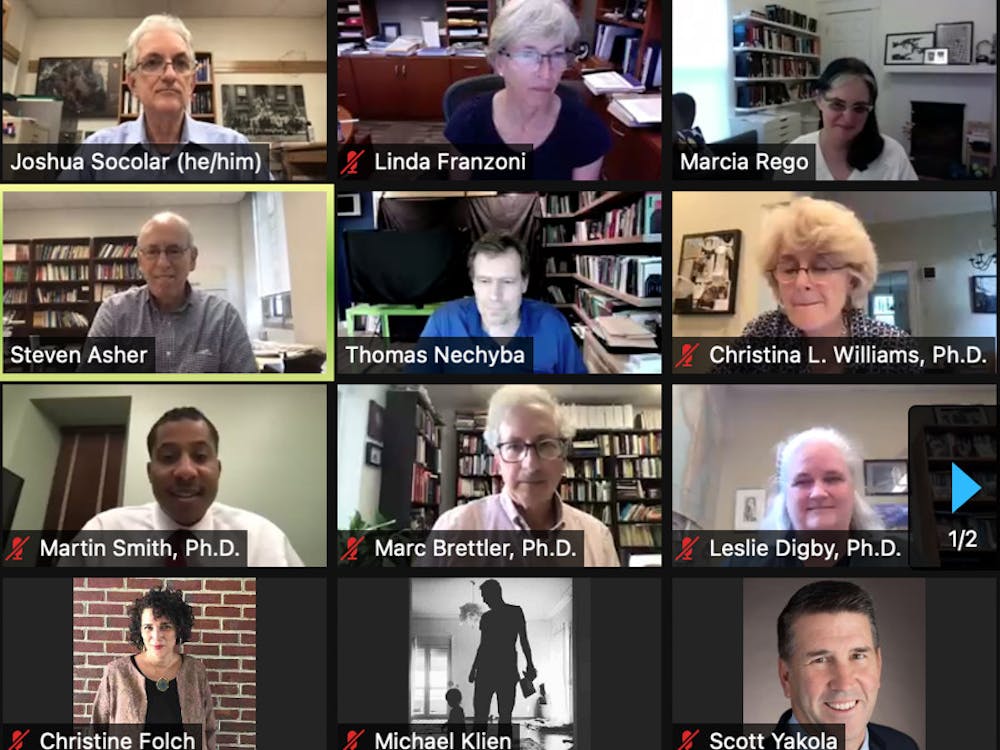Over-reliant on Rate My Professor? You might be in luck.
The Arts & Sciences Council considered a proposal for a new undergraduate course evaluation questionnaire at their Thursday meeting. A vote on the new form, which would replace the one students currently fill out on DukeHub, is expected in early November.
The proposed form has 12 questions. Some have multiple options and ask the student to rate their engagement with the course or to evaluate their instructor and teaching assistants. Other questions are free responses and invite the participant to describe what they’ve learned, for instance, or to reflect on which components of the course were the most intellectually stimulating.
Some key characteristics include a new section for teaching assistant evaluations and a new preamble that will be intended to help students understand the purpose behind the evaluations and to commit to limiting their biases.
“It seems to me that one aspect of our work with students is more than just facilitating learning of content and development of skills; it's also about changing their perspectives on how they view learning itself,” said David Maone, professor of the practice of education. “And it seems to me that as we roll this out, one aspect of our work with students will be to guide them in seeing assessment and feedback and evaluation as something more than just a transactional occurrence at the end of a course, like an add-on, but to see it as integral to the whole process of learning itself.”
Responses to course evaluation questions designated “shareable” are provided to students unless faculty “opt out.” Additionally, departments and instructors can supplement the form with customized qualitative and quantitative questions.
Students will receive their final grade for a course three days early if they either complete the evaluation for that course or opt out of the evaluation by providing a specific rationale.
“[The students we worked with] told us, ‘Look, we’re sitting there refreshing the browser to see the grade.’ So three days is painful, having to wait for three days. It’s obviously something that could be adjusted if the response rates weren’t going up,” said Thomas Nechyba, professor of economics and chair of the Arts and Sciences Committee on Assessment.
Senior Shrey Majmudar, who met with the Committee throughout their process of constructing the new questionnaire, said that the three days policy hit the “sweet spot” between being too harsh and providing insufficient incentives.
“Talk to any undergraduate student, and they will tell you that right at the end of the semester, after final exams finish, students are looking at DukeHub multiple times a day, waiting to see when those final grades will be up. And so we thought that one, maybe even two, days might be a little bit too less, versus I think, with four or five days, people want to be done with the semester, they want to move on to winter break or summer break,” Majmudar said.
The recommendation for the new system was drafted by the Arts and Sciences Committee on Assessment, which began working on the proposal in fall 2020. The Committee met every other week for a year and consulted with various administration members, faculty, staff and students, including representatives from Duke Student Government.
The Committee eventually settled on a set of objectives for a new system that was approved by the Arts & Sciences Council in April 2021. One goal was to prioritize questions about students’ learning experiences above questions evaluating the instructor and teaching assistants. Another was to use the form as a way to educate students about the purpose of evaluations and of the potential for bias.
One problem with the current evaluation system is a lack of student responses, Nechyba said.
“We have very low response rates in the current process. Those response rates range between 40 and 60%,” Nechyba said.
Nechyba also noted that there are too many questions on the form, and many of those questions don’t apply to all courses. There is little room for nuanced feedback, he said. And the information from the evaluations is unreliable—students often turn to Rate My Professor instead.
The survey would be distributed using a new platform called Watermark, which has become the new platform for fall 2021 evaluations. Under the new platform, department staff can view return rates in real time, and instructors are able to add custom questions to their evaluation form.
In other business
The Council also heard a proposal for a new certificate program called Digital Intelligence. The courses would draw from computer science, electrical and computer engineering, math, public policy and law, among other fields.
Students would take a core class—”Computation, Ethics and Policy”—as well as four electives in computational thinking, ethics and policy, communication and computation. They would also complete a capstone course.
“The goal of this certificate program is to provide students with a working knowledge of algorithms, [artificial intelligence], data driven research and other emerging technologies in context of the responsible progress of those technologies,” said Nita Farahany, Robinson O. Everett, distinguished professor of law and one of the architects of the proposed certificate.
Get The Chronicle straight to your inbox
Sign up for our weekly newsletter. Cancel at any time.
The Council also approved a motion to remove a moratorium on new certificate programs.

Chris Kuo is a Trinity senior and a staff reporter for The Chronicle's 118th volume. He was previously enterprise editor for Volume 117.

